
|
Vintage Television Sets and Colour Television Sets from the Dawn of Television until Now
Echard Etzold's Site |
At the beginning of the 1930's the change from mechanical television to full electronic television was prepared all
over the world. Japanese, Russian and British scientists work on this field, but the leading countries in case of electronic television where the U.S.A and Germany. In the U.S.A. Vladimir Zworykin, who had just changed from Westinghouse to the RCA, worked on full-electronic television. Together
with other RCA engineers, he developed the first experimental television sets in the year 1931 which were presented to the press in 1932. This set here might be the earliest full electronic picture-tube television receiver which is still in operating condition and which survived from these days.
|


The old photo on the left hand taken around 1934 shows this exact tv set with the secretary of the president of NBC and Felix the Cat. Felix the Cat (on link photo displayed with 60 line resolution on a mechanical set in 1930) was one of the many models used in early tests and experimental transmissions. The photo on the right hand shows the set with Felix the Cat. One can see the wood grain in the left photograph matches this set exactly. There were appr. four to six of these sets made and used for testing signal strength around New York city. While this receiver is full electronical without any mechanical devices, for the camera, a flying spot scanner with a scanning disk was used.
|

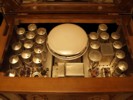
The cabinet on this set and the power supply are serial number 2, while the rest of the chassis' are serial number 1, except the picture receiver which is serial number 8. Due to the extensive length of the picture tube, it was installed vertically. For the horizontal view a mirror
was used which was fixed in the lid.
|


The chassis of this set was divided into several modules which could easily be removed and replaced. This is the earliest module-based
television chassis ever known. On the right photo the kinescope module is shown with the holder for the picture tube and the deflection units.
|

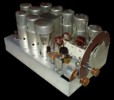
These photos show the video amplifying unit (left hand) and the sound unit (right hand). The IF for the video unit was 6 MHz which is very high in
comparison to later prewar television sets. The IF for the sound module was 4 MHz.
|
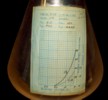
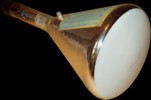
The picture tube has still the original label showing the data of the tube and the time stamp of Oct. 6, 1931. One picture consists of
120 lines with a frame repetition frequency of 24 frames per second. The picture tube as a
diameter of nine inches. Some RCA reports and documents about this receiver are downloadable here:
Experimental Television System 1931 (500 KByte),
Experimental Television Receiver 1931 (2 MByte),
Experimental Television Transmitter 1931 (2 MByte),
Experimental TV and Kinescope 1931 (4 MByte).
|
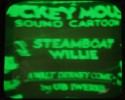
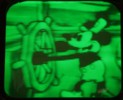
These are recent screenshots from the set in operating mode. RCA used green-colored phosphors in their first
picture tubes like it is known from oscilloscope picture tubes. Appr. 90 lines are visible. This might be not only the first
CRT television set in the world but also the oldest tv set with crt which is still in operational mode.
|
Schematics
Here.
Tubes
C730, two RCA-871, RCA-879, three UY227, twelve UY224, five UY235, two UX210.
Photos: © 2006, 2007.
Links:
 Zur Zur
![[Text in deutsch]](Images/flag_de.jpg)
![[Zurück]](Images/arr-supr.jpg)
Version: December 12, 2007,
|